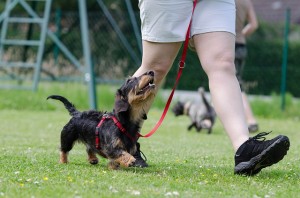Dogs and Apartment Living – 11 Important Tips For Owners
Being able to afford a home with a yard doesn’t usually come cheap; living in an apartment has therefore become the norm for a lot of city dwellers. For a lot of folks, this has given rise to the challenge of adapting pets, especially dogs, to apartment living. Since this trend has come to stay, it has become imperative for dog owners to have a clear understanding of what it takes to cater to the needs of this important family member. Here are a few things to consider in ensuring a pleasurable apartment living experience for both you and your dog.
- Check with Your Landlord: You will need to be sure that pets are allowed in the building before making a decision. Some buildings allow dogs but have regulations with regard to breed, size and so on. Ensure you are quite familiar with and abide by the laid down rules.
- Consider Your Living Space: Do you have enough room to accommodate both of you? This would determine whether you should go for a small or large dog. You want your dog’s area to be properly carved out for him or her in such a way that you don’t get into each other’s way.
- Breed Matters: Most dog breeds can adapt to living in an apartment. However, some breeds are more adapted to apartment living than others because they are calmer or don’t do much moving around, or they require less space to do so. Breeds such as the Chihuahua, Shih Tzu, English Bulldog, French Bulldog, Corgi, Pekingese, Pug, Pomeranian, Standard Schnauzer, Tibetan Spaniel, Yorkshire Terrier and the Dachshund among others can cope better in an apartment.
- Personality Matters: Another important consideration is your dog’s personality. Although your dog’s breed may generally adapt to apartment living, there could be exceptions. Your dog may just have higher energy levels than others of the same breed and would require greater attention. Also, since you would have neighbors, you wouldn’t want to pose a nuisance to others with a dog that is hostile or barks often.
- Exercises Are Important: Dogs are genetically wired to run around and will need exercises to ensure their physical and mental well being. Daily walks and exercises are therefore a necessity regardless of size or breed. Apart from these daily walks, your dog will also require regular exercises to stay active and happy. The amount of exercising your dog will require depends on individual energy level but exercising is a must. In addition, regular visits to a dog park will also afford him or her the opportunity to play with other dogs and ward off monotony. If you work long hours or you are not able to meet up with the exercise requirement of your dog, a dog walker will come in handy to help you meet this very important need.
- Feeding: Don’t compromise on quality when it comes to your dog’s feeding. Stick to pet food rather than people food to avoid a situation where your dog could go begging or eating from other places. Also, ensure an ample supply of water.
- Training: You will have to completely housebreak your dog. This might pose a bit of a challenge if you live high-up; so you may need to start out using piddle pads and work at it until you achieve 100% housebreaking. You will need to also give your dog other behavioral training and promptly obey cues. This is one reason why trained adult dogs may be a better deal than puppies for apartment living.
Endeavor to establish regular times for feeding and other activities so that your dog gets used to a particular routine.
- Update Vaccinations And Medications: Since there are others living in close proximity, it is quite easy for parasites and diseases to spread. You, therefore, need to assure your dog’s health and protect yourself and others. Always ensure that your dog’s shots are regular and up-to-date.
- Maintain Good Hygiene: Clean up messes immediately and keep your home clean and fresh regularly. Vacuum your home often to get rid of pet dander and ensure you keep your dog clean.
- Have A Good Supply And Variety Of Toys: Spending a lot of time indoors can lead to boredom; you will therefore need to provide a lot of toys for your dog to play with and scratch on. This would also prevent him or her from substituting your furniture or other belongings as play things.
- Keep Your Dog Safe: Keep your pet safe from domestic accidents by keeping windows and patio doors and securely locked. Visits to the balcony should be on a leash. Also, sharp objects and poisonous substances should be kept safely away.


